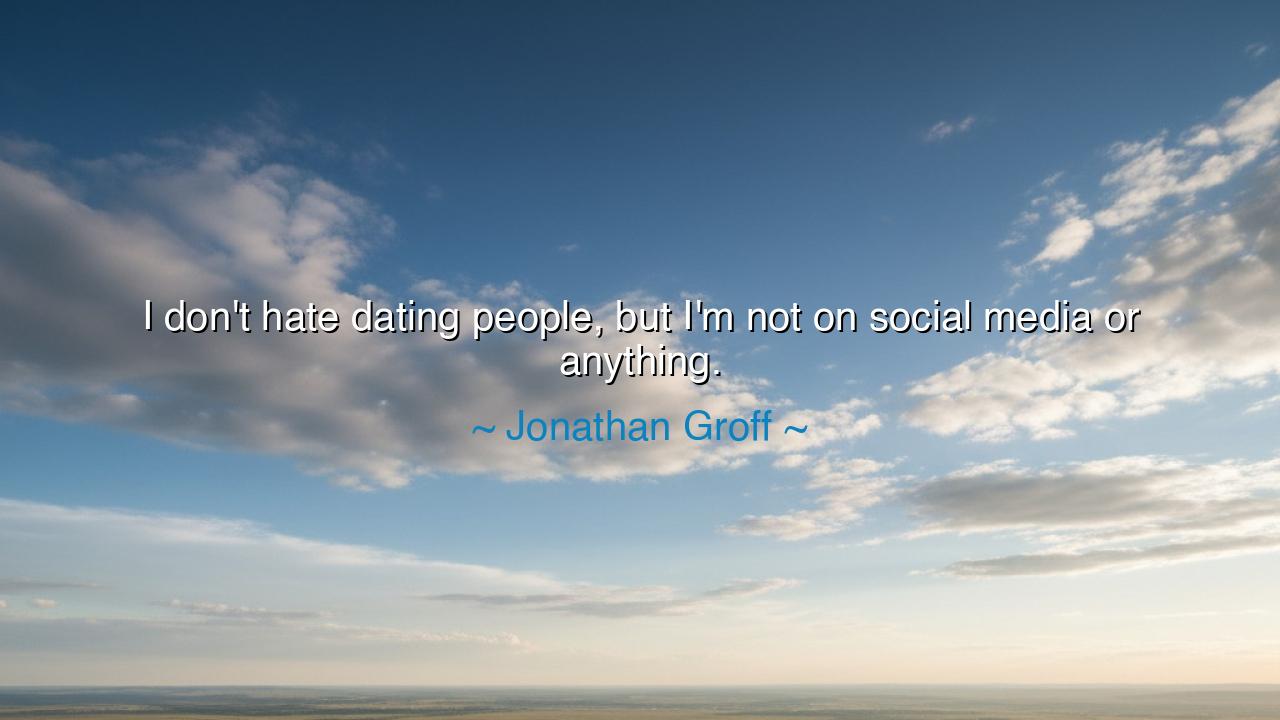
I don't hate dating people, but I'm not on social media or






In the marketplace of modern courtship, a quiet voice chooses a narrower road: “I don’t hate dating people, but I’m not on social media or anything.” So speaks Jonathan Groff, and the sentence lands like a pebble that makes clean circles on a crowded lake. It is not a curse against love, nor a sermon against the age; it is a boundary drawn with a steady hand. The heart is open to encounter—dating—yet the gates to the ceaseless square of spectacle—social media—remain closed. Here is the wisdom: affection thrives in presence, while attention is too often auctioned to the highest noise.
Hear the deeper music within his words. To say “I don’t hate dating” is to honor companionship, conversation, the gentle risk of letting another read your pages. But to add “I’m not on social media” is to guard the conditions under which those pages are read. The soul asks to be met, not marketed; to be known, not tallied. Platforms can widen the net, yes—yet they can also thin the fiber of attention until no thread can hold. Groff’s line blesses the dinner table and questions the dashboard; it prefers the pulse in the room to the pulse of the feed.
This choice has an origin in older ways. Before the lantern of the screen, lovers learned each other by letters, by walks, by the unrepeatable rhythm of two voices in one weather. Even now, many discover that the humblest spaces—porch steps, bus rides, shared kitchens—are where trust takes root. Dating is craft, not commerce: it is how we practice honesty and listening. Social media, by design, is theater: it invites curation, applause, and a fear of missing what was never ours. To keep the first while refusing the second is not refusal of the century; it is reverence for the human scale.
Let a story walk beside this teaching. A violinist in a city of glass decided, after years of scrolling, to keep a flip phone for one winter. She did not renounce love; she renounced the endless foyer between herself and any room. Invitations became fewer, but truer. She met a teacher at a neighborhood café—no profile, no archive of comments, only the slow revelation that he loved rain and mended things. When friends asked for their “origin story,” she smiled and said, “A table, a Tuesday, and no cameras.” Their bond did not grow faster; it grew deeper, watered by attention that had not been leased to the crowd.
History offers its lantern, too. Rainer Maria Rilke, counseled a young poet to “love the questions” and to build love as two solitudes that border and protect one another. He lived before feeds, yet his counsel fits the hour: intimacy needs shelter from the wind of opinion. The stage has its place—social media can raise signals, find communities, amplify good—but the hearth is where bread rises and hearts mend. Between stage and hearth, Groff’s sentence chooses the hearth for the work of meeting a person.
What, then, is the lesson to pass along? That boundaries are instruments, not walls. You may welcome dating while declining the public square’s choreography; you may favor the slowness that lets character reveal itself without the glare. The measure of wisdom is not how many eyes watch your love grow, but how well you watch over it yourselves. A seed can sprout in a stadium, but it prefers a garden.
Take these counsels as provisions. (1) Set a first-meet rule: choose spaces where attention is undivided—no phones on the table, no photos, only presence. (2) Keep a small circle of elders or friends for counsel, and spare the crowd the play-by-play. (3) Practice a daily fast from the feed; let boredom call forth curiosity rather than scrolling. (4) Honor letters and voice: send notes, leave voicemails—the kinds of speech that cannot be algorithmically scored. (5) If you do use social media, use it as a bulletin board, not a bloodstream: post rarely, love richly, and let your truest moments remain unbroadcast. Do this, and you may find what the ancients promised and the moderns still seek: that the heart, given quiet, grows audible; that two lives, given shelter, can become a home.
Therefore remember: to be for dating and wary of social media is not contradiction but craft. It is to choose a human pace over a viral one, a gaze over a glance, a life over a performance. And in that choosing, love is freed to be what it has always been—a conversation brave enough to be private, and strong enough to be real.






AAdministratorAdministrator
Welcome, honored guests. Please leave a comment, we will respond soon